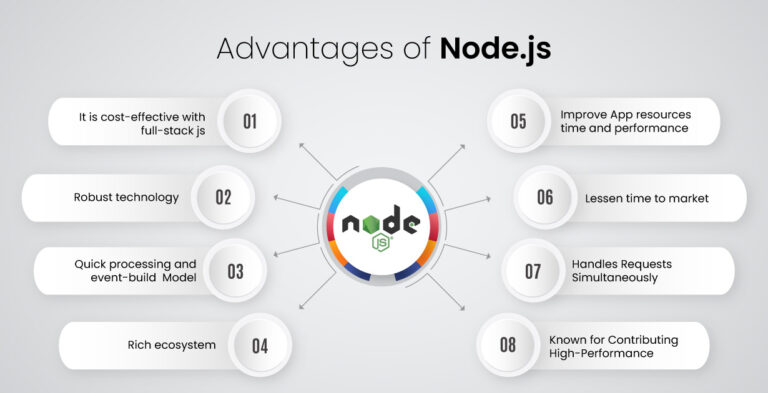When it comes to understanding node.js advantages & disadvantages for your web app, there are various points considered by a CTO and tech expert. For instance, tech scalability, speed, performance, application limitations, and many more. So, their decisions are taken in a way to regulate the performance.
It has also become a major cross-platform Mobile app development tool as a basic technology for a large number of platforms, such as Apache PhoneGap, React Native, and NativeScript.
1. What is Node.js?
The definition of Node.js is that it is a Javascript run-time environment that helps in the implementation of JavaScript code server-side. It is an open-source cross-platform JavaScript that assists in the development of real-time network applications.
Node.js strengths and weaknesses make it the subject of a heated discussion. What is the advantage of node.js To set the record straight, we have analyzed both node.js pros and cons in an attempt to find out what projects can benefit from this technology choice? So, why use Node.js?
2. Advantages of the Node.js

2.1. Robust technology stack
Node.js uses a strong technology stack which the right side of it. Javascript is undoubted the most common programming language. In turn, node.js is the stand-alone name in the industry.
- Better regulation and complete developer productivity
- Code sharing and employ
- Its performance and speed
- Trouble-free knowledge sharing with the team
- A vast number of free tools
2.2. Quick processing and event-build Model
Node.js is fast and yes it’s not a myth also. Comparing how GO, PHP, Java, and Node.js tackle simultaneous requests. There are several reasons for Node.js to appear similar results as it takes less time to write codes.
According to a node.js user survey, Javascript is the most popular programming language for front-end development processes. It is the same as the comprehensive programming language. It needs less time and effort to learn and work with Node.js even if someone is a beginner.
Read More- Flutter Marks the Beginning of Gen-Next Application Development
2.3. Rich ecosystem
One word –npm, a default Node.js package manager also obeys as a marketplace for open-source Javascript tools. Which plays a crucial role in the more advance of this technology. Within the npm registry as of now, and with new roles being issued every week, the Node.js ecosystem is somewhat rich.
Similar stats point out that 97 percent of modern web applications comprise npm modules.
2.4. It is cost-effective with full-stack js
Node.js has been considered a full-stack JavaScript for obeying the client as well as the server-side applications.
Therefore, the advantage is that you don’t have to hire separate developers for the backend as well as the front-end development.
It saves both your time and money.
2.5. Improve App resources time and performance
Here where Node.js, with its single-laced event-loop model, gives a non-blocking asynchronous architecture without creating more threads by engaging some resources. This helps boost the impartiality of your application since it can deal with various concurrent users at the same time.
2.6. Lessen time to market applications
As we all know time is invaluable to any Time to market is mainly depending upon its quality and performance. Since Node.js is lightweight so it allows developers to fast-track their whole development speed.
2.7. Handles Requests Simultaneously
Node.js gives the option of non-blocking I/O systems. It also provides you to process various server requests at the same time.
Node.js system can hold concurrent requests superior to Ruby or Python. The arriving requests get in the way and are fastly and systematic.
2.8. Known for Contributing High Performance
It has been raised earlier that Node.js explains the JavaScript code straight through Google’s V8 JavaScript engine. This engine follows the JavaScript code right into the machine code. This makes it easier and faster to execute the code in a productive way.
The speed of the code implementation is also multiplied by the runtime environment as it supports the non-blocking I/O operations.
3. Node.js Disadvantages

Well, Node.js also has some cons which need to be necessarily discussed here and we all should know how it affects in many ways Node.js disadvantages
3.1. Performance Congestion with Heavy Calculation tasks
The largest drawback of Node.js even now is its inability to process CPU-bound tasks. But, to understand what the roots of this issue are, we need a little bit of context. Let’s begin with the basics, with JavaScript itself.
As we know, Node.js is a runtime incapacity environment that carries out JavaScript on the server-side. Being a frontend programming language, JavaScript uses a single thread to process tasks fastly. Interlacing is not needed for it to work, because tasks in JavaScript are lightweight and take a small CPU.
3.2. Library Support System is not Strong
Compared to other languages, JavaScript does not have a robust and well-equipped library system.
As a result, users are forced to take support from the common library for doing tasks, like processing and handling database operations, Object-Relational Mapping, XML parsing, etc.
This makes it hard for developers to execute common programming tasks with Node.js.
3.3. Nonsimultaneous Programming Model
If you want to boost the expandability of the application. The requirement is that the application should embrace an asynchronous programming model.
However, developers find this model to be tougher than linear blocking I/O programming.
The disadvantage of the asynchronous programming model is that the code becomes uncoordinated. And programmers depend on the fix calls.
4. Conclusion
Node.js recommends many advantages for developers than its disadvantages. Moreover, it has expanded the area of JavaScript applications and can be used for both frontend and backend servers.
With the progress of time, maximum business is embracing Node.js and has ended in getting a great and positive outcome for their business. If you also want to develop an application using NodeJS, you can consult us with heir senior node.js developers in India.
5. FAQ
Q1. What is Node.js?
Node.js is an open-source, JavaScript run-time environment that helps in the execution of JavaScript code outside of a browser.
Q2. What are the benefits of Node?
Node.js offers various benefits for web app development like easy scalability, ease of learning, remarkable performance, and is highly extensible.
Q3. What are the cons of Node.js?
The Disadvantages of Node.js are the uncertainty of the Application, Programming Interface, the lack of a robust library support system, and the falling of skilled node.js developers in the present market.
Q4. Why is node.js great for startups?
Because Node.js is easy to learn and keeps things simple. Provide faster time to market.



